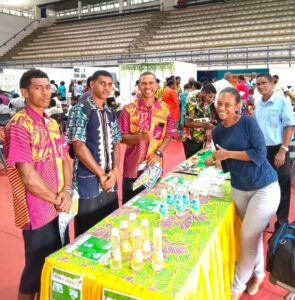Marketing challenges end for co-operative Published by the Fiji Times: May 18, 2024
May 22, 2024Empowering Fiji’s Agricultural Future: A Deep Dive into the Agricultural Marketing Authority’s Impact. Published By The Fiji Sun: 17th August, 2024
August 19, 2024
The Evolution and Impact of the Agricultural Marketing Authority (AMA): A Catalyst for Sustainable Rural Development in Fiji
Published By The Fiji Times: August 16, 2024
The Agricultural Marketing Authority (AMA), trading as Fiji Agromarketing, has been instrumental in transforming the agricultural and aquacultural landscape of Fiji since its establishment in 2004. Over the years, AMA has evolved from a modest government initiative into a pivotal institution that plays a critical role in enhancing the livelihoods of rural, remote, and maritime communities. This article delves into the journey of AMA, its vision, mission, key functions, strategic objectives, and the impact it has made on Fiji’s rural economy.
Vision and Mission: A Commitment to Sustainable Growth
At the heart of AMA’s operations is a clear and compelling vision: “Marketing for a sustainable rural economy.” This vision reflects the organization’s dedication to fostering economic growth in Fiji’s rural areas by ensuring that agricultural and aqua-cultural producers have access to markets that offer fair prices and sustainable demand.
AMA’s mission statement, “To facilitate the purchase, sale, and export of Agro and Aqua produce to stimulate economic growth within rural, remote, and maritime communities’’, further underscores its commitment to bridging the gap between producers in isolated communities and the broader market. By facilitating the trade of agricultural and aqua-cultural products, AMA not only enhances the economic prospects of these communities but also contributes to the overall development of Fiji’s agricultural sector.

Key Functions: Supporting Farmers and Fishermen
AMA’s key functions are designed to support the growth and sustainability of Fiji’s agricultural and aqua-cultural industries:
Assisting Producers in Marketing: One of the core functions of AMA is to assist agro and aqua producers in marketing their produce. This involves providing essential support to farmers and fishermen, ensuring that they have the tools, knowledge, and opportunities to market their products effectively. AMA acts as a bridge between producers and markets, helping to secure better prices and stable demand for their products.
Identifying and Developing Markets: AMA plays a crucial role in identifying potential markets for agricultural and aqua-cultural products. By facilitating and developing these markets, the Authority ensures that Fijian producers can access a broader customer base, both domestically and internationally. This market development is essential for sustaining the livelihoods of rural producers and driving economic growth in remote areas.
Purchasing, Selling, and Exporting Produce: Another vital function of AMA is the purchasing, selling, and exporting of agro and aqua products. This function enables producers to focus on production while AMA handles the complexities of marketing and distribution. By connecting Fijian producers with buyers around the world, AMA helps to enhance the economic viability of the agricultural sector and promotes Fiji’s products on a global stage.

Governance: The Role of the AMA Board
The governance of AMA is overseen by a Board, which is the governing body responsible for the performance of the Authority. The Board’s functions and powers are defined by the AMA Act, ensuring that the organization operates in line with its mission and vision.
The Minister for Agriculture & Waterways is responsible for establishing and appointing the Board members, which includes:
- A Chairperson
- A Chief Executive Officer
- Three other Board members
To ensure effective governance and strategic oversight, the Board is required to meet at least four times a year. These meetings are critical for discussing the Authority’s operations, reviewing its performance, and making decisions that align with its strategic objectives.
Strategic Objectives: Driving Sustainable Development
AMA’s strategic objectives are aligned with its mission to stimulate economic growth within rural, remote, and maritime communities. These objectives include:
Increasing Sustainable Market Linkages: AMA aims to enhance wealth creation for farmers in rural and maritime areas by increasing sustainable market linkages. By connecting farmers with reliable markets, AMA helps to secure their livelihoods and promote economic stability in these regions.
Promoting Youth/Women Employment in Agriculture: AMA is committed to promoting youth/women employment in the agricultural sector through the development of agribusinesses. By supporting the contracted farming model and providing end-to-end post-harvest logistics, AMA encourages young people to engage in agriculture and contributes to the sector’s long-term sustainability.
Extending Financial Inclusion: As a trusted marketing agent for grassroots farmers, AMA plays a key role in extending the government’s National Financial Inclusion objective. Through active engagement with rural communities, AMA helps to increase the penetration of financial services, enabling farmers to access banking and other essential services.

Improving Commercial Agriculture Footprint: AMA seeks to enhance the commercial agriculture footprint in remote areas by increasing land utilization and improving the livelihoods of Fijian farmers. By promoting commercial agriculture, AMA helps to drive economic growth and improve the quality of life in rural communities.
Cultivating Partnerships and Promoting Innovation: AMA is dedicated to cultivating partnerships with the Ministry of Agriculture & Waterways and promoting innovation platforms such as organic farming and smart agriculture. These initiatives are designed to improve the effectiveness of agricultural practices in rural and maritime areas, contributing to sustainable development.
Alignment to National Strategy
The functions and objectives of AMA are closely aligned with the Government of Fiji’s strategic goals, as outlined in the National Development Plan and the Ministry of Agriculture & Waterways Strategic Development Plan (SDP) 2024-2028. This alignment ensures that AMA’s activities contribute to the broader national effort to develop a resilient and sustainable agricultural sector.
Achievable Impact: Transforming Rural Economies
The impact of AMA’s work is measurable and significant. Through its initiatives, AMA aims to:
Increase Agricultural Produce Collection: By increasing the collection of agricultural produce from rural and maritime areas by 15%, AMA seeks to inject more cash into these communities, supporting rural livelihoods and helping to bridge the rural-urban divide.
Boost Agricultural Trade: AMA targets a 10% increase in agricultural trade through the introduction of new business opportunities. This growth will boost Fiji’s agricultural exports, contributing to the country’s economic development.
Expand Product Portfolio: AMA is focused on growing its product portfolio by introducing new products and enhancing the value of existing agricultural commodities. This diversification helps to secure better market positions and increase revenue for farmers.
Promote Farmer-Inclusive Agribusiness: By improving farmer-inclusive agribusiness development, AMA aims to expand the agro-industry and increase the participation of rural and maritime farmers in the sector by 5%. This initiative promotes economic inclusivity and strengthens the agricultural value chain.
Key Initiatives: Building a Stronger Agricultural Sector
To achieve its strategic objectives, AMA has implemented several key initiatives:
Establishing Strategic Collection Centers: AMA is establishing strategic collection centers across Fiji to secure market linkages for farmers in rural and maritime zones. These centers provide farmers with pre-agreed pricing for their produce, ensuring that they receive fair compensation for their efforts.
Growing the Contracted Farming Model: AMA is expanding the contracted farming model to open up new markets for farmers in rural and maritime areas. This model provides farmers with advanced farming support, including tools, materials, and equipment, as well as guidance on sustainable agricultural practices.

Facilitating Farmer Clusters: AMA is facilitating the formation of farmer clusters into commercial agriculture setups. These clusters promote production and economic benefits to both the community and the country. AMA also provides financial literacy training and access to other related services to help farmers achieve commercial success.
Increasing Access to Banking and FNPF: AMA is working to increase farmer access to banking and Fiji National Provident Fund (FNPF) services. By facilitating the extension of these services to rural and maritime areas, AMA helps farmers to take advantage of financial benefits and achieve social well-being.
History: A Legacy of Growth and Inclusion
Since its inception in 2004, Fiji Agromarketing has made significant strides in supporting gender diversity and inclusion in the workplace. The organization has grown into a key player in Fiji’s agricultural sector, promoting sustainable development and improving the livelihoods of thousands of Fijian farmers and fishermen.
Conclusion: A Future of Sustainable Growth
The Agricultural Marketing Authority (AMA), trading as Fiji Agromarketing, continues to be a driving force in the development of Fiji’s rural economy. Through its vision of “Marketing for a sustainable rural economy” and its mission to facilitate the purchase, sale, and export of agricultural and aqua-cultural produce, AMA is helping to build a brighter future for Fiji’s rural, remote, and maritime communities.
As AMA moves forward, its focus on strategic initiatives, market development, and sustainable practices will ensure that it remains a cornerstone of Fiji’s agricultural sector, contributing to the economic prosperity and social well-being of all Fijians.
